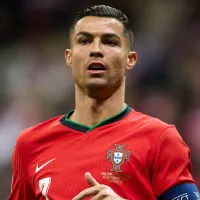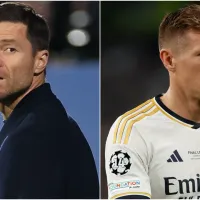For a manager, the World Cup is often one long heart attack. These men often prepare four years to lead their team into the biggest tournament in sport, and all that’s guaranteed is 270 minutes of soccer and a lack of predictability that make the games so much fun to watch.
Few managers make it out of World Cups unscathed. Fewer ever get back to the tournament, and it’s a rare and talented boss who makes it to consecutive World Cups with the same country.
With squad selections for the tournament in Brazil just weeks away, and the games beginning in less than 50 days, now is a good time to take a look at where the bosses of 2010 in South Africa are now.
Javier Aguirre, Mexico

Aguirre was brought in for a second spell in charge of Mexico in 2009 after Sven Goran-Eriksson’s disastrous tenure, and he righted the ship to qualify El Tri for the World Cup. But bizarre decision making at the tournament (starting a striker with no club, not naming a captain, dropping your first-choice goalkeeper on the eve of the tournament) led the public to turn on the coach.
Aguirre resigned after Mexico was knocked out of the tournament in the second round. He expressed a desire to coach in England, but needless to say, no offers were forthcoming. He’s now the coach of La Liga cellar-dwellers Espanyol, where he’s doing admirably.
Radomir Antic, Serbia
Antic’s Serbia came into the tournament with high hopes, but crashed out after losing their final group match against an already-eliminated Australian team when they only needed a point.
Antic, who has managed both Real Madrid and Barcelona, stayed on but resigned after Serbia’s unsuccessful Euro 2012 qualifying campaign. He then sued the Serbian FA, around the time he was being sacked from his coaching job in China. He’s been out of the game since 2013.
Marcelo Bielsa, Chile

Bielsa is beloved by his peers, players, and football fans. The stoic and academically inclined Bielsa reached God-like status in Chile after he qualified them for the World Cup in 2010 and reached the knockout stage, where Chile lost to Spain.
Despite rumors he was leaving, Bielsa signed a contract extension through 2015 – but he threatened he would leave if Jorge Segovia was elected President of the Chilean FA. Segovia was elected, and though the result was later annulled, Bielsa walked. His last post was with Athletico Bilbao, he hasn’t managed since the 2012-2013 season.
Bob Bradley, USA

Always the USA’s second choice, Bradley signed an uneasy contract extension after the American’s thrilling and exhausting run to the Round of 16 in South Africa.
But after a shellacking by Mexico in the 2011 Gold Cup Final at the Rose Bowl, Bradley was sacked and the US hired the long-chased Jurgen Klinsmann. Bradley surprisingly took the Egyptian National team job, and led them through a revolution and the Arab Spring to within a playoff of the World Cup, when the Pharaohs heartbreakingly lost to Ghana.
Bradley has since taken a job with Stabaek in Norway, becoming the first American to coach in a European top flight league. Bradley is a pioneer, in every sense of the word.
Fabio Capello, England

Don Fabio had the worst month of his professional life in South Africa, subjecting us to Ledley King, Emile Heskey, Rob Green, and an England narrative that turned very sour very quickly.
Although Capello stayed on after the World Cup to qualify the team for Euro 2012, this marriage was never likely going to end well. And in the end, Capello sensationally resigned after the English FA stripped John Terry of the captaincy for racially abusing Anton Ferdinand – even though Capello had himself stripped Terry of the armband in 2010 for an affair with Wayne Bridge’s girlfriend.
Capello quickly took over Russia, and is now set to lead a second World Cup campaign which he hopes will go much better than the first one did.
Vicente Del Bosque, Spain

The only manager in the modern era to win a Champions League, European Championships, and the World Cup, the esteemed Del Bosque led Spain to glory in South Africa four years ago, and is ready to defend the title in Brazil, having won Euro 2012 on the way.
Raymond Domenech, France

He was spectacularly fun – unless you are French, of course. When France qualified on the merits of a handball in 2010, you knew things could get ugly, but Domenech’s tawdry, incompetent, egomaniacal management ensured things would get historically ugly.
After France’s opening game, Zinedine Zidane said that, “Domenech is not a coach, and France is not a team.” At halftime of their second game, striker Nicholas Anelka launched a profane rant at Domenech, who sent him home. That sparked a training boycott, and France was off to the races.
Domenech went out by not shaking the hand of South African manager Carlos Alberto Parreira. He hasn’t coached since.
Dunga, Brazil

In Brazil, you can barely get away with not playing the beautiful game and winning. If you don’t play the beautiful game and you don’t win, you’ll never make it.
That’s what Dunga found out after he was sacked following Brazil’s quarterfinal exit at the hands of Holland in South Africa. His next position was with his first club team as a player, Internacional, but he was dismissed after only a year in charge. He’s not currently coaching at this time.
Sven-Goran Eriksson, Ivory Coast
Yes, Sven-Goran Eriksson managed the Ivory Coast at the 2010 World Cup. He took over in March 2010, just three months before the tournament, after flaming out with Notts County.
Eriksson only stayed on with Cote d’Ivoire for three months on a mercenary deal – he left immediately after the Ivory Coast were ousted from the Group of Death in the first round. Eriksson’s next job was with Leicester City, he’s now coaching in the Chinese League.
Ricki Herbert, New Zealand
Herbert is New Zealand’s most distinguished coach ever, and his team’s performance at the 2010 World Cup, when they went home unbeaten, was the best two weeks in the history of football in the country.
But many in New Zealand put the All White’s heroic performance down to the leadership of senior players like Ryan Nelson, instead of at Herbert’s feet. By the time New Zealand were thwacked by Mexico in a playoff for a spot in Brazil, Herbert had announced he would retire from managing the national team. It was a somewhat acrimonious end to a glittering tenure.
Ottmar Hitzfeld, Switzerland

The decorated Hitzfeld led the Swiss to a major upset of Spain in their first game in South Africa, but the campaign quickly flamed out in the group stages. Hitzfeld stayed on to qualify the Swiss for Brazil, but he has announced his retirement effective on July 1st.
Huh Jung-Moo, South Korea

At the time of the 2010 World Cup, Huh was in his third stint as the South Korea boss. After the tournament, he went to manage Korean club team Incheon United. He was fired in 2012, and hasn’t managed since.
Matjaz Kek, Slovenia

Kek’s Slovenia came up just short of making it to the knockout stages of the 2010 World Cup, stuck on four points to the USA and England’s five.
Kek stayed on with Slovenia, but left the national team after an unsuccessful Euro 2012 qualifying campaign. He is now the coach of HNK Rijeka, in Croatia’s top flight.
Kim Jong-Hun, North Korea

This was the man in charge of the most mysterious team in football, North Korea, in South Africa. His team was of course thrashed – after a gallant opening game against Brazil – and upon returning home, the rumors flew.
One report had his party membership revoked and the disgraced manager working hard manual labor as punishment. A FIFA matter showed nothing of the sort had happened. A more plausible report had the boss being publicly shamed and questioned in front of hundreds of people, including North Korea’s sports minister. There were always rumors that he was taking instructions on the touchline from King Jong-Ill himself.
In any case, the boring version is that Moo went back to coach his club side 4.25 Sports Team, one of the biggest clubs in North Korea, who he managed before taking the national team job. An aside, 4.25 is owned by the North Korean army.
Lars Lagerback, Nigeria

The experienced Lagerback had a short, unhappy spell in charge of the Super Eagles. Fresh off resigning his post with Sweden, Lagerback was handed a five-month contract to lead Nigeria at the World Cup.
But the African side played terribly, and was banned from international football for two years by the President, Goodluck Jonathan, a ban that was later overturned. Lagerback, unsurprisingly, wanted out, and he turned down a contract extension from the Nigerian Football Federation. He is now the coach of Iceland, who he led within a playoff of the 2014 World Cup.
Paul Le Guen, Cameroon

Le Guen took his first national team job in 2009 with Cameroon, and things went well until the World Cup, when Cameroon fell at the first hurdle. Le Guen immediately resigned, and he’s now the coach of Oman.
Marcelo Lippi, Italy
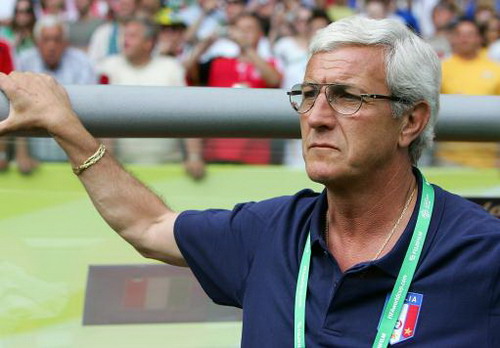
Lippi meant to go out on top. He left the Italian national team three days after leading them to World Cup glory in 2006, and was prepared to ride off into the sunset.
But after Italy’s disappointing Euro 2008 and Roberto Donadoni’s resulting dismissal, Lippi came out of retirement for another shot at glory in South Africa. Of course, it was a total disaster. Selecting a squad mainly based of the 2006 team, Italy crashed out in the group stage with a loss to Slovakia. Lippi resigned, and took a job in China that makes him one of the highest paid managers in the game. He’s enjoying success in Asia, winning the AFC Champions League in 2013.
Joachim Low, Germany
Low’s Germany team lit up the South African World Cup, finishing third. Low’s previous contact disputes with the German FA resolved, he’s the man at the helm of Germany until at least 2016, barring an unexpected result – good or bad – in Brazil.
Diego Maradona, Argentina
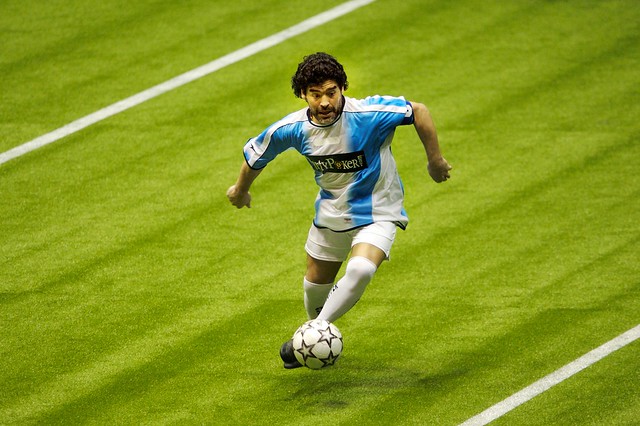
Undoubtedly the manager who drew the most headlines at the 2010 World Cup, Maradona was much maligned throughout the footballing world for his performance as manager of Argentina.
Still, after the tournament, the President of the Argentine FA announced Maradona would be offered a new four-year contract. Instead, ten days later, the board announced they would not extend Maradona’s contract, which provoked a vicious response from Maradona himself.
Maradona’s next coaching job was with Al Wasl in the UAE. He lasted just over a year. Maradona is scheduled to work the 2014 World Cup as a pundit for Venezuelan television.
Gerardo Martino, Paraguay
You now know him as the coach of Barcelona, but in 2010, Gerardo Martino had a much less glamorous gig: Manager of Paraguay. Martino planned to leave the role after the 2010 World Cup, but after Paraguay’s surprise run to the quarterfinals, he agreed to stay on until the end of the 2011 Copa America, where Paraguay reached the final.
Martino then left for Newell’s Old Boys, and on from there to Barcelona.
Bert van Marwijk, Netherlands
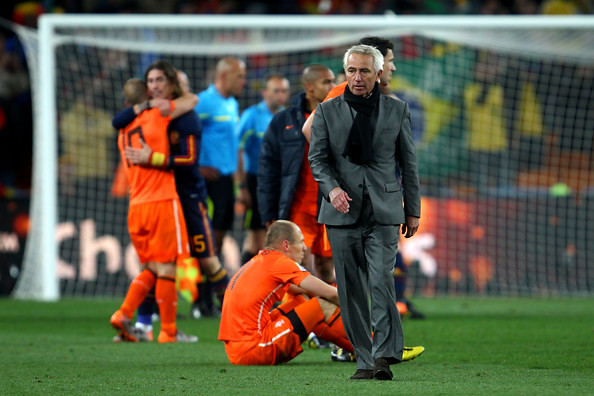
Always a bit testy, van Marwijk nonetheless led his team to the World Cup Final, where they disgraced themselves against Spain. Van Marwijk met his end at Euro 2012, when Holland lost all three games and van Marwijk resigned.
After turning down offers from Sporting Lisbon and Southampton, van Marwijk signed with Hamburg. However, he only lasted 143 days, as bad results and a bad atmosphere at the club required his ouster in early 2014.
Takeshi Okada, Japan

Okada – who took over his native Japan in 2007 when the previous coach had a stroke – was given his due for turning the Samurai Blue into a slick side that just came up short on penalties of a quarterfinal spot at the 2010 World Cup.
Okada left the national team after the tournament and ventured into club management with Hangzhou Greentown in China until late 2013.
Morten Olsen, Denmark
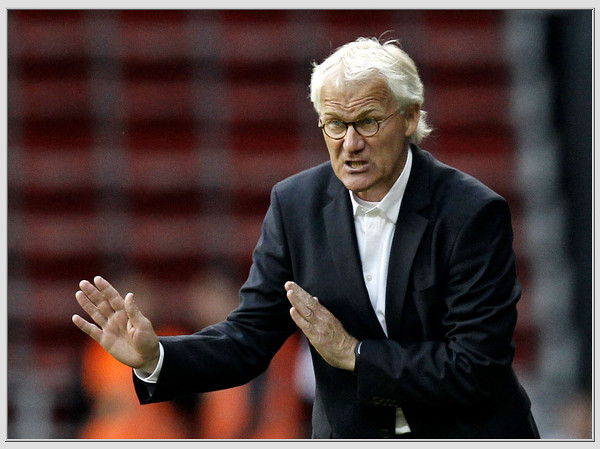
Olsen is in his 14th year coaching Denmark, and neither side has expressed any desire to move on. This stability is incredibly rare in the international game.
Denmark never sparked at the 2010 World Cup, and they went out in the group stage. Olsen has stayed on through Denmark’s unsuccessful 2014 World Cup qualifying campaign.
Carlos Alberto Parreira, South Africa
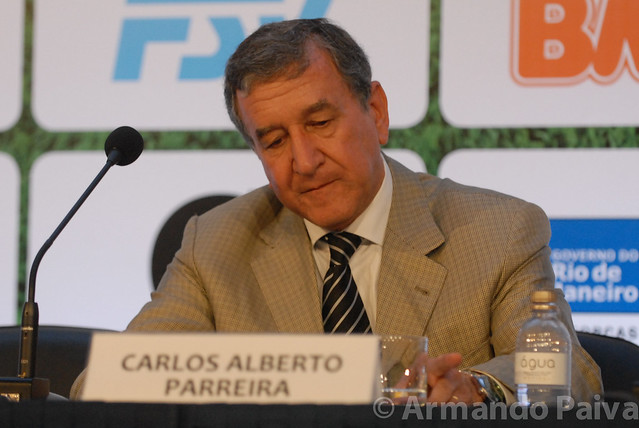
The World Cup winning coach of Brazil was brought in to guide the host nation after Joel Santana was sacked in 2009. Parreira did admirably, guiding South Africa to four points and coming up short on goal difference for a place in the knockout round.
Parreira has since retired from management, and is once again closely involved with his native Brazil as an advisor in their preparations for the 2014 World Cup.
Carlos Queiroz, Portugal
Queiroz has had a number of high profile jobs in his career, and the Portugal spell wasn’t a bright spot. Playing a highly defensive formation, Portugal failed to score in three of their four World Cup games and went out with a whimper in the Round of 16.
Queiroz was then bizarrely given a six-month ban for doping by the Portuguese Anti-Doping Authority, and then sacked.
Queiroz landed with Iran, who he is preparing to lead into the 2014 World Cup.
Milovan Rajevac, Ghana
The World Cup was by far the most successful period of the Serbian Rajevac’s career. After leaving Ghana after the tournament for storied Al-Ahli in Saudi Arabia, Rajevac has enjoyed less success.
Rajevac was quickly dismissed in the Middle East, and then was in the final two for the vacant Egypt job, but was beaten out by Bob Bradley – the coach he beat in the Round of 16 in South Africa.
Instead of Egypt, Rajevac went to the Qatar national team, where he was sacked after losses to India and Vietnam in 2011. He hasn’t coached since.
Otto Rehhagel, Greece
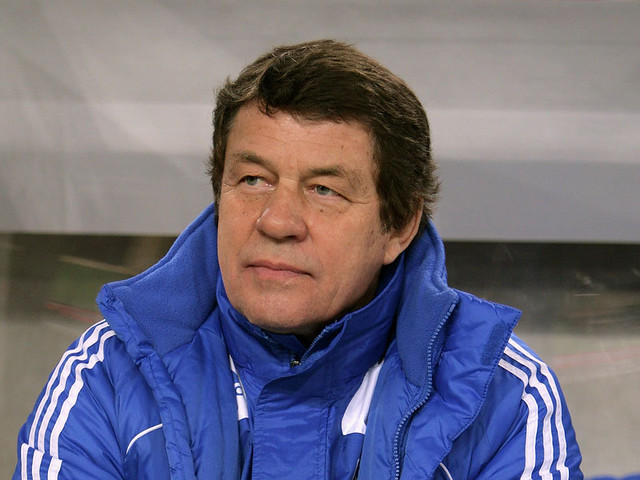
The 2010 World Cup was the end of a long road with Greece for Otto Rehhagel. The peek of that reign came six years before in Portugal when Greece won Euro 2004. Greece got their first World Cup goal and win at the tournament, but Rehhagel resigned afterwards.
He then went to Hertha Berlin in the Bundesliga, but he couldn’t save them from relegation in his only year in charge in 2012. At 75, Rehhagel is retired after a great career.
Reinaldo Rueda, Honduras

Rueda came up coaching in the Columbian ranks, but in 2010 he was coaching Honduras. Not much was expected of the team, and they did not promote themselves in any way, going out with a single point and no goals scored.
Rueda’s tactics were severely questioned, and his reputation took a beating in Honduras. He left the post, and landed with Ecuador, who he has guided to this summer’s finals in Brazil.
Rabah Saadane, Algeria
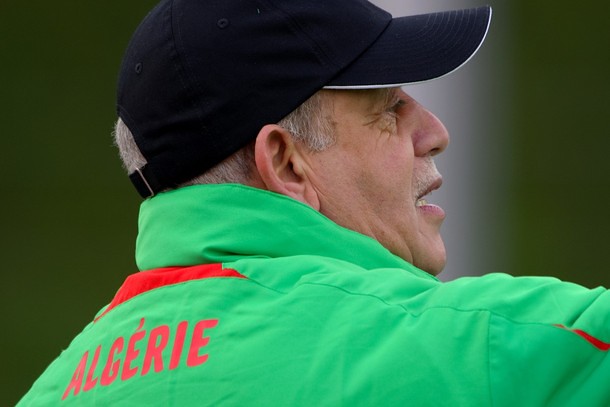
Saadane was in his fifth spell in charge of Algeria in South Africa, with his stints spanning from 1981 to 2010. After Algeria went obstinately and ignominiously out of the World Cup, Saadane didn’t last long – he resigned in September, and he now coaches ES Satif in the Algerian league.
Oscar Tabarez, Uruguay

The Teacher led the upstart team of the tournament in South Africa, and Tabarez’s demeanor betrayed none of the histrionics that accompanied Uruguay on their run to the semifinals.
In 2011, Tabarez led Uruguay to Copa America glory, and he is the second-longest tenured coach in the field for Brazil.
Pim Verbeek, Australia
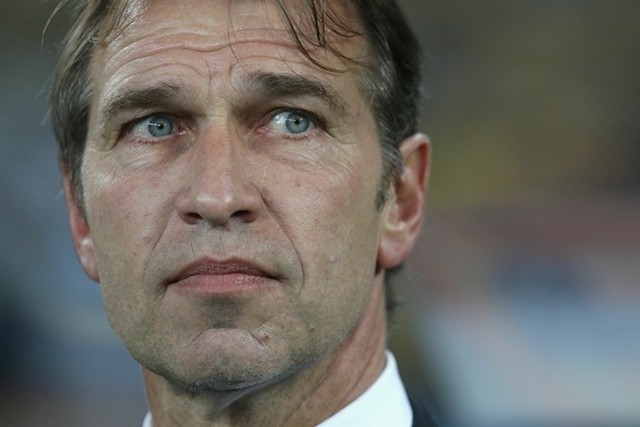
Verbeek’s Australia went out at the first hurdle in South Africa, and the press never really got along with the manager. Verbeek actually took his next job – youth technical director with Morocco – before the World Cup even started.
He still has that job, which sees him also coach the Moroccan U-23s.
Vladimir Weiss, Slovakia
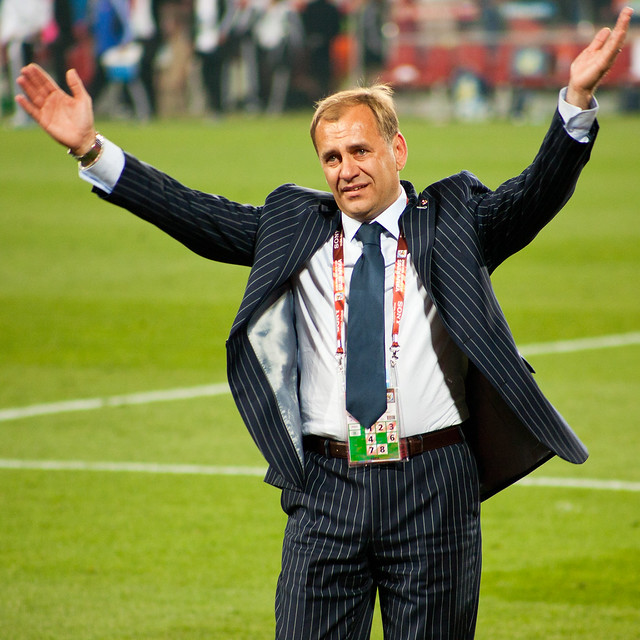
Weiss’ best player in South Africa arguably was his son, and the tandem were etched into Slovakian football lore when the team beat Italy 3-2 to go through the knockout stages. The fairytale didn’t last forever though – Weiss parted ways the national team after unsuccessfully trying to qualify for Euro 2012.
He now coaches FC Kairat in Kazakhstan.
Of the thirty-two 2010 World Cup coaches, just five are in the same job today, and four will be leading their nation into a second consecutive World Cup. Which bosses will fall by the wayside before 2018? Well, pretty much everyone. Let the games begin.

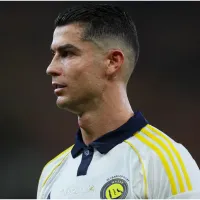


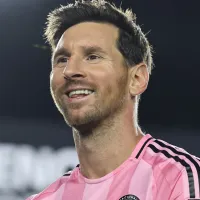

![PRETORIA, SOUTH AFRICA – JUNE 23: Landon Donovan of the United States celebrates with teammate Edson Buddle after scoring the winning goal that sends the USA through to the second round during the 2010 FIFA World Cup South Africa Group C match between USA and Algeria at the Loftus Versfeld Stadium on June 23, 2010 […]](https://ds-images.bolavip.com/news/image?src=https%3A%2F%2Fimages.worldsoccertalk.com%2Fwebp%2Ffull%2FWST_20140429_CMS_100135_landon-donovan.webp&width=490&height=275)







